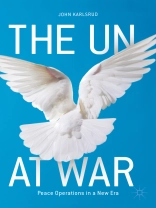This book is a critical political and institutional reflection on UN peace operations. It provides constructive suggestions as to how the UN and the international system can evolve to remain relevant and tackle the peace and security challenges of the 21st century, without abandoning the principles that the UN was founded upon and on which the legitimacy of UN peace operations rests. The author analyses the evolving politics on UN peace operations of the five veto powers of the UN Security Council, as well as major troop-contributing countries and western powers. He investigates the move towards peace enforcement and counter-terrorism, and what consequences this development may have for the UN. Karlsrud issues a challenge to practitioners and politicians to make sure that the calls for reform are anchored in a desire to improve the lives of people suffering in conflicts on the ground—and not spurred by intra-organizational turf battles or solely the narrow self-interests of member states. Finally, he asks how the UN can adapt its practices to become more field- and people-centered, in line with its core, primary commitments of protecting and serving people in need.
Зміст
Chapter 1: Introduction.- Chapter 2: UN Peace Operations in a Changing World.- Chapter 3: The Evolving Politics of UN Peace Operations.- Chapter 4: New Capabilities, Tools, and Technologies.- Chapter 5: UN Stabilization Operations, Violent Extremism and Counter-terrorism.- Chapter 6: Competition or Burden-sharing? UN and Regional Peace Operations in Africa.- Chapter 7: People-centered Reform at the UN? UN Peace Operations at a Crossroads.- Chapter 8: Serving the People.
Про автора
John Karlsrud is Senior Research Fellow at the Norwegian Institute of International Affairs (NUPI), Oslo, Norway, and has previously been Special Assistant to the UN Special Representative of the Secretary-General in Chad and the Central African Republic. His most recent books are UN Peacekeeping Doctrine in a New Era (2017), and The Future of African Peace Operations (2016).












